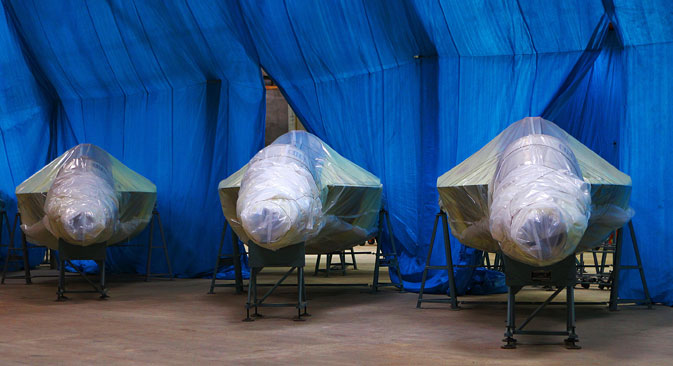
Yak-152 to be produced at the Irkutsk aviation plant. Source: Sergei Mamontov / RIA Novosti
In 2015 the Irkutsk Aviation Plant will launch two samples of the light Yak-152 trainer. Developed by the expert Yakovlev Design Bureau, which is part of the Irkut Corporation, the new trainer is destined for primary pilot preparation. The "flying desk" will be tested in 2016, after which it will go into serial production.
For initial training, the Yak-152 plans to use flight professionals from the air force academies. "In the first years of training, students will learn to fly with instructors, they will learn how to execute a simple flight known as the 'pancake' and then land," a Russian Defense Ministry spokesman told RBTH. "The training will show if the student is capable of continuing flying."
According to the spokesman, the Yak-152 will help future pilots carry out highly skilled maneuvers and obtain experience with nocturnal flights and flights in difficult meteorological conditions. That is why the new trainer will be supplied with state of the art navigation equipment, as well as the CKC-94M emergency escape system.
The Russian Defense Ministry says that not only future fighter and fighter-bomber pilots will train with the Yak-152, but also commanders, as well as co-pilots flying bombers, military transportation planes and even helicopters.
"After acquiring the initial skills flying the Yak-152, students will then move on to specialized trainers," explained the defense spokesman. "For example, students wishing to fly the Su-35, the T-50 and even the fighter-bomber Su-34 will first train with the Yak-130. Pilots flying the Tu-22M and Tu-160 bombers will first hone their skills on the specially modified passenger Tu-134UBL plane."
Light attack planes and trainers: Demand grows
The light training planes segment is currently going through a phase of active development. There is a lot of competition between the Brazilian Tukano and Super Tukano, as well as the Swiss PC-7 and PC-9 produced by the Pilatus Company. Many aviation construction companies are also developing and producing light trainers.
Remarkably, in the beginning of the 2000s American Beechcraft bought the license from Swiss manufacturers to build its own PC-9s. The plane was then renamed as the T-6B Texan-2 and is now used for training pilots not only in the U.S. Air Force and Navy, but also in Canada, Israel, Germany and even New Zealand.
Meanwhile, in many countries light trainers are used as attack aircraft. In particular, the Columbian Air Force has often used the Super Tukano to launch effective strikes against narcotics bases and rebel organizations.
"Now, as we see, thanks to the targeting pods and the various on-board equipment for dropping satellite-guided bombs, such as the American JDAM, the trainers are becoming an inexpensive alternative to attack aircraft, capable of hitting targets without being vulnerable to anti-aircraft systems," says Anton Lavrov, independent military expert and co-author of the book The New Russian Army.
“Most rebels can defend themselves during attacks from the sky with only the MANPADS (man-portable air defense systems) and firearms."
Export prospects
For now it is difficult to estimate the export potential of the new Russian plane, especially since its flight and technical characteristics are still unknown. However, it will certainly arouse interest among the nations that are regular purchasers of Russian aviation technology.
The Yak-152, besides its primary task of training pilots, could also serve as a relatively inexpensive anti-insurgency attack plane, for which there is already a big demand.
Yakovlev's deputy general director of test flying, test pilot Roman Taskayev, told the ITAR-TASS news agency that "these planes should be built in great numbers and they should not be too expensive." It is the low price that must serve as the Yak-152's competitive edge on the foreign market.
According to a representative of the Russian aviation industry, the Irkutsk aviation plant is now preparing construction facilities in order to begin production of the Yak-152. Interestingly enough, the new trainer will use an uncommon engine for airplane construction, a 400-horsepower diesel.
The Irkutsk Aviation Plant is now receiving the technical documentation for the new plane. If everything goes as planned, by the end of the year the plant will have already produced the first construction elements, as well as the new trainer's components and assemblies.
All rights reserved by Rossiyskaya Gazeta.
Subscribe
to our newsletter!
Get the week's best stories straight to your inbox